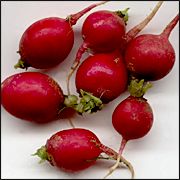The most important relationship I seek to nurture in the treatment room is the one a patient has with their own body. We live in a culture that teaches us to override pain, defer to outside authority, and push through discomfort. Patients often arrive hoping I can “fix” them, but the truth is, we can’t do the work for them. We can offer guidance, insight and support, but healing requires their full participation.
Herbs & Botanicals
Radish (lai fu zi)
What is radish? What is it used for?
The radish is a type of vegetable, which is believed to have originated in western Asia, but is now cultivated worldwide. Many cultures use radish as a food, either alone or added to salads. In traditional Chinese medicine, radish seeds are an important component of many herbal remedies.
The seeds of the radish are gathered at the start of the summer and dried in the sun. They can be used either raw or after being parched, and can be consumed whole, sliced, grounded into powder or crushed into a type of juice.
 Radish seeds have pungent, sweet and neutral properties, according to the principles of traditional Chinese medicine, and are affiliated with the Spleen, Stomach and Lung meridians. The two main functions of radish seed are to eliminate food retention, and to move down qi and resolve phlegm. Radish is often used as a digestive aid to treat conditions ranging from abdominal pain to acid reflux, abdominal distention and diarrhea. Radish seeds are also used to treat coughs accompanied by large amounts of phlegm, and asthma. The German Commission E has approved radish to treat peptic disorders and catarrhs of the upper respiratory tract.
Radish seeds have pungent, sweet and neutral properties, according to the principles of traditional Chinese medicine, and are affiliated with the Spleen, Stomach and Lung meridians. The two main functions of radish seed are to eliminate food retention, and to move down qi and resolve phlegm. Radish is often used as a digestive aid to treat conditions ranging from abdominal pain to acid reflux, abdominal distention and diarrhea. Radish seeds are also used to treat coughs accompanied by large amounts of phlegm, and asthma. The German Commission E has approved radish to treat peptic disorders and catarrhs of the upper respiratory tract.
How much radish should I take?
The typical dosage of radish is between six and 10 grams, decocted in water for oral administration. Radish seeds can also be crushed to create a type of juice.
What forms of radish are available?
Whole radishes can be found at supermarkets worldwide. Radish seeds are available at many Asian markets or herbal shops, and are sold whole, dried, as powders, or as part of larger herbal formulas.
What can happen if I take too much radish? Are there any interactions I should be aware of? What precautions should I take?
Radish seeds should be used with caution by patients suffering from qi deficiency. Radish roots should not be consumed by patients with an inflamed stomach or intestinal inflammation. Radish also should not be consumed in conjunction with ginseng.
References
- Blumenthal M, Busse WR, Goldberg A, et al. (eds.) The Complete German Commission E. Monographs. Therapeutic Guide to Herbal Medicines. Boston: Integrative Medicine Communications, 1998, pp. 193-194.
- Chen GT, Yang SW. Practical Diagnostics and Therapeutics of Integrated Traditional Chinese and Western Medicine. Medicinal & Scientific Herbology Press of China, 1994.
- Chen JK. Ulcerative colitis. Medical Acupuncture 2002;13(3).
- Gruenwald J, Brendler T, Jaenicke C (eds.) PDR for Herbal Medicines. Montvale, NJ: Medical Economics Company, 2000, pp. 628-629.
- Yang SS, et al. Comprehensive Clinical Manual of TCM. Beijing Scientific Press, 1993.


